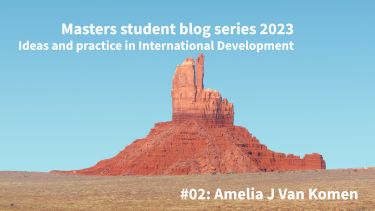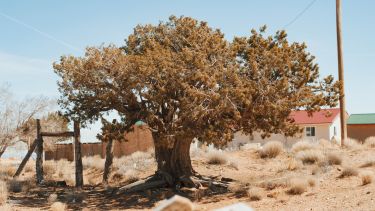The term 'food desert' is employed within the development sector, but is now also popular among non-experts, governments, and reporters when discussing food insecurity.
However, the lesser-known term 'food apartheid' – referring to a system of food disruption driven by patterns of structural racism and power imbalances – and the foundation of thinking it provides can bring conversations closer to the true nature of this social condition. This is especially when examining populations particularly impacted like the Navajo Nation (Johnson and Eglash, 2021). The Capabilities Approach supplies this framework and helps to effectively address the issue.
Headed by Amartya Sen, the Capabilities Approach (CA) focuses on the required abilities for people to lead the lives they choose. CA evaluates development issues beyond distributive terms and focuses on how the distributions of resources allow or inhibit holistic wellbeing (Schlosberg and Carruthers, 2010). Capabilities are context-specific opportunities to obtain desired facets of wellbeing (Miller and Thomas, 2020).
The Navajo Nation, or Diné Bikéyah, experiences the highest levels of food insecurity in the United States with 76.7% of its 173,000 person population facing a disruption of food intake due to a lack of money or resources (Bennion et al., 2022).
Discussions by outsiders of the Navajo Nation’s access to food tend to use unhelpful perspectives. The US government categorizes Diné Bikéyah as a 'food desert' (Bennion et al., 2022).
Centering this term creates narratives of naturally-occuring phenomena when the reality is a socially-created racialized process of oppression (Johnson and Eglash, 2021). Navajo food insecurity is created through several issues driven by a history of capitalism and forced relocation: soil toxins limiting farming, inadequate roads, lack of nutritious food, poverty, and limited knowledge of nutrition (Bennion et al., 2022).
It is clear that rather than a food desert, the Diné people live in food apartheid.
A CA lens exposes that at the heart of Navajo 'food apartheid' is the denial of agency. This reframes the problem from living in a 'food desert' to being denied capabilities in active 'food apartheid'. Solutions must focus on the freedoms generated by access to food rather than food access itself (Schlosberg and Carruthers, 2010).
For example, the common proposed solution of building new supermarkets does not necessarily create capabilities for the Navajo people. It does not enable community choice, create better infrastructure, increase knowledge, or create equality (Miller and Thomas, 2020).
A store might allow a person access to food, but neglects the freedoms generated by true food security. Access would become a capability only when the community could define the solution and have power over the type, growth, knowledge, and use of food.
CA examines what is necessary to convert available resources into the potential for a full life (Miller and Thomas, 2020). Understanding that the food insecurity in the Navajo nation is 'food apartheid' that hinders capabilities to wellbeing allows a critical analysis of the proposed solutions and outdated perspectives on the issue.
CA promotes giving agency to the Diné people and acknowledges the barriers to true food security.
References
- Bennion, N. et al. (2022) ‘Driving Distance and Food Accessibility: A Geospatial Analysis of the Food Environment in the Navajo Nation and Border Towns’, Frontiers in Nutrition, 9(1), pp. 1-11.
- Johnson, K. and Eglash, R. (2021) ‘Redesigning On-line Food Consumption to Enhance Racial and Social Inclusion through Generative Production Networks’, New Design Ideas, 5(1), pp. 21-40. (Accessed 25 October 2022)
- Miller, D. and Thomas, M. (2020) ‘Policies to Reduce Food Insecurity: An Ethical Imperative’, Physiology & Behavior, 222(1), pp. 1-4.
- Schlosberg, D. and Carruthers, D. (2010) ‘Indigenous Struggles, Environmental Justice, and Community Capabilities’, Global Environmental Politics, 10(4), pp. 12-35.
Written by Amelia J Van Komen, an International Development (Public Health) masters student.




